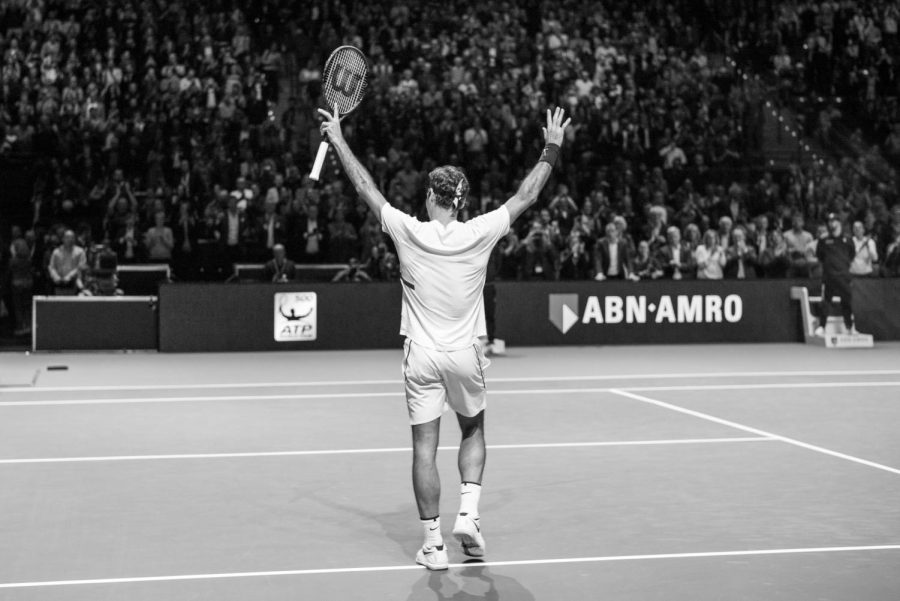Roger Federer: 24 years of magic
Credit: Courtesy of Flickr user R Boed
WSPN’s Jeffery Zhang discusses the impact of Roger Federer’s announcement and his plans to retire.
October 11, 2022
“Think ‘Roger Federer.’ Keep your emotions under wraps and control what you can control.”
Every Sunday morning I would hear my tennis coach say the same words over and over. Now, I won’t hear those words anymore.
Roger Federer, the Swiss teenager who matured into an athlete revered for his grace and class, announced on Sept. 15 that he was going to retire from competitive tennis following the Laver Cup Tennis Tournament in London, UK.
To date, Federer has won an astonishing number of matches, gaining him a place amongst the “The Big Three.” His accolades include 20 grand slams, making him one of the tennis greats, and someone who I’m constantly inspired and motivated by. Of his 31 grand slam appearances, the acclaimed Swiss legend has dominated the court and only left 11 titles up for grabs for his opponents throughout his career, winning more than 82% of matches during his career.
Winning grand slams isn’t as simple as it seems, as these historic tournaments are only held four times a year. During the tournaments, you’re up against 128 other players who are the same level or higher than you, proving the most challenging mental battle a tennis player can face.
Federer’s first professional breakthrough came in 2001, when he upset seven-time Wimbledon champion Pete Sampras in the fourth round of the tournament. An upset signifies a lower rank tennis player defeating a higher rank player, and this occurrence usually sends fans reeling. Later in 2004, 18-year-old Federer would clinch the Australian Open title, his first grand slam, and become the new world number one. He would go on to win three grand slam singles titles in 2004, 2006 and 2007 before encountering a young Rafael Nadal, who would become one of Federer’s greatest rivals and greatest friend.
Playing professional tennis requires a tremendous amount of traveling. Many people fail to realize the amount of dedication needed to play professional tennis, especially at the level Federer was playing. Yet, Federer never forgot about his family, and after almost every single match, win or loss, he would always thank his family for supporting him during his career.
Federer’s ability to produce the highest level of tennis while under incredible amounts of pressure is unbelievable. If I received the same amount of fame and growth as Federer, I would crumble. All of the eyes on me, expecting perfection and precision, is magnified when you have a reputation to live up to. Even at such a young age, the expectations begin creeping in as soon as I step onto the court, my fate all left up to me to decide.
Federer is human, and because of that, not every match is his best. Yet, his ability to give his all in every single match, no matter what, is why he is hailed as one of the greatest tennis players in history. Federer isn’t just a robotic tennis player, he is vulnerable and this strengthens his game. The tears he shed after victory and defeat showed many how deeply he cared about the sport.
Federer’s enduring resilience and mental fortitude were aspects of his character that appealed to many across the globe. His grace and elegance while playing, combined with the emotions he displayed after both winning and losing, were what won the hearts of tennis fans and garnered him a legacy and fanbase like no other.
While tennis fans all over the world debate who the best men’s player is, personally being a Djokovic fan, Federer’s skill is undeniable. His movement on the court was simple, elegant and graceful and his perfect technique was an art. His ability to keep his gaze on the point of contact after hitting the ball was not only a masterclass on stability, but emphasized his confidence in his shots.
Although Federer is known for his enduring mental strength, he was once an emotional teenager who struggled to maintain composure on the tennis court, often breaking rackets and swearing when he lost. However, he matured over time and managed to deal with his emotions in a calm but fiery manner. Federer’s transformation over the years is what makes his class and composure during matches so incredible.
Federer’s retirement signals the beginning to the end of a “golden era.” With Federer’s retirement and the other members of the “Big Three,” who include Rafael Nadal, Novak Djokovic and himself, dealing with aging and frequent injuries, the spotlight has shifted to young tennis stars. Among these are Carlos Alcaraz, who recently won the U.S. Open Tennis Championships at the age of 19-years-old and Iga Swiatek who held onto a 37-match streak for 135 days.
While his retirement may be bittersweet, Federer has inspired countless people, including myself. How he displayed himself on the court is a goal that I strive to achieve. His ability to keep his emotions under control and use his anger as fuel in a sport where you can only rely on yourself is something truly admirable.
“Finally, to the game of tennis, I love you and will never leave you,” Federer said.
Federer’s influence on the tennis community and his impact on many aspiring young tennis fans will remain for years to come, and I’m so grateful I was able to witness his greatness.





![Last Wednesday, the Wayland School Committee gathered to discuss a number of topics regarding the health curriculum and Innovation Career Pathway course. Another large topic of conversation was the ways to potentially mitigate distracting cell phone usage. "These [phones] are going to distract your learning and social relationships," Superintendent David Fleishman said. "That's concrete right there."](https://waylandstudentpress.com/wp-content/uploads/2025/06/Screenshot-2025-06-04-at-9.49.31 PM-1200x886.png)



























![Troy Hoyt finishes the Boston Marathon, running for the Hoyt Foundation. T. Hoyt is the son of Hoyt Foundation CEO Russ Hoyt.
“[Running a marathon] might seem like a big thing, when it’s presented to you at first, but if you break it up and just keep telling yourself, “Yes, you can,” you can start chipping away at it. And before you know it, you’ll be running the whole 26 miles, and you won’t even think twice about it.” T. Hoyt said.](https://waylandstudentpress.com/wp-content/uploads/2025/04/C36E8761-1CBB-452E-9DF2-543EF7B1095E_1_105_c.jpeg)













































